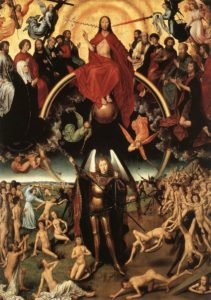On the Nature of True Liberty (1-3)
The document has each paragraph numbered with a title and I will present the document in sections of three paragraphs at a time. I will include links and footnotes for terms which may not be immediately understood by all. My intra-text commentary [in red with brackets] will be limited to clarifying the text rather than opinion.
Here begins the text:
1. Liberty, the highest of natural endowments, being the portion only of intellectual or rational natures, confers on man this dignity – that he is “in the hand of his counsel”(1) and has power over his actions. [The fact that a man can choose between x and y is a gift from God, unlike the animals.] But the manner in which such dignity is exercised is of the greatest moment [the manner in which it is used is more important than “liberty” itself], inasmuch as
on the use that is made of liberty the highest good and the greatest evil alike depend. Man, indeed, is free to obey his reason, to seek moral good, and to strive unswervingly after his last end. [Last end means that in which all things find fulfillment and happiness because they are built for it. God is the last end of all things.] Yet he is free also to turn aside to all other things; and, in pursuing the empty semblance of good [no man ever chooses evil directly, he is always pursuing the appearance of a good], to disturb rightful order and to fall headlong into the destruction which he has voluntarily chosen. The Redeemer of mankind, Jesus Christ, having restored and exalted the original dignity of nature, vouchsafed special assistance to the will of man; and by the gifts of His grace here, and the promise of heavenly bliss hereafter, He raised it to a nobler state. [It is a nobler state because we can choose to love God as opposed to being forced.] In like manner, this great gift of nature has ever been, and always will be, deservingly cherished by the Catholic Church, for to her alone has been committed the charge of handing down to all ages the benefits purchased for us by Jesus Christ. Yet there are many who imagine that the Church is hostile to human liberty. [The Church is all about “Do's and Don'ts”] Having a false and absurd notion as to what liberty is, either they pervert the very idea of freedom, or they extend it at their pleasure to many things in respect of which man cannot rightly be regarded as free.
Here Leo XIII lays out the definition of freedom and recognizes that in recent times (following the French Revolution in particular) there has been an attempt to characterize liberty in a way that is unrelated to man's last end, or his true happiness.
2. We have on other occasions, and especially in Our encyclical letter Immortale Dei,(2) in treating of the so-called modern liberties, distinguished between their good and evil elements [the idea of modern liberty is rather a mix of good and evil elements]; and We have shown that whatsoever is good in those liberties is as ancient as truth itself, and that the Church has always most willingly approved and practiced that good: but whatsoever has been added as new is, to tell the plain truth, of a vitiated kind, the fruit of the disorders of the age, and of an insatiate longing after novelties. [The modern idea of liberty isn't a concept that replaced the old, it is rather a modification] Seeing, however, that many cling so obstinately to their own opinion in this matter as to imagine these modern liberties, cankered as they are, to be the greatest glory of our age, and the very basis of civil life, without which no perfect government can be conceived, We feel it a pressing duty, for the sake of the common good, to treat separately of this subject. [He is probably referring to the United States and other countries which had begun to speak of liberty as the cornerstone of government, and wants to make sure that these groups understand the nature of true liberty, rather than simply throwing the word around when it could mean two different things.]
The second half of the 19th century was the time period in which liberty (not yet clarified in its definition, and so often times the wrong type of liberty), gained most of its traction. Hence, Leo XIII is still giving his reasons for writing this encyclical.
3. It is with moral liberty, whether in individuals or in communities, that We proceed at once to deal. [Now we are breaking down the ambiguity of the word which is being thrown around.] But, first of all, it will be well to speak briefly of natural liberty [The type spoken of in Paragraph 1]; for, though it is distinct and separate from moral liberty, natural freedom is the fountainhead from which liberty of whatsoever kind flows, sua vi suaque sponte. [All liberties require a human choice between good and evil.] The unanimous consent and judgment of men, which is the trusty voice of nature, recognizes this natural liberty in those only who are endowed with intelligence or reason; and it is by his use of this that man is rightly regarded as responsible for his actions. [Understanding that you could have chosen otherwise creates responsibility.] For, while other animate creatures follow their senses, seeking good and avoiding evil only by instinct [nothing naturally seeks evil], man has reason to guide him in each and every act of his life. Reason sees that whatever things that are held to be good upon earth may exist or may not, and discerning that none of them are of necessity for us, it leaves the will free to choose what it pleases. But man can judge of this contingency, as We say, only because he has a soul that is simple, spiritual, and intellectual – a soul, therefore, which is not produced by matter, and does not depend on matter for its existence; but which is created immediately by God, and, far surpassing the condition of things material, has a life and action of its own so that, knowing the unchangeable and necessary reasons of what is true and good, it sees that no particular kind of good is necessary to us. [We aren't forced to choose one thing over another.] When, therefore, it is established that man's soul is immortal and endowed with reason and not bound up with things material, the foundation of natural liberty is at once most firmly laid.
Leo XIII is responding forcefully to the materialists of the 18th century who wish to claim that man is completely reducible to his material parts. The mind can be explained in terms of neurons and the soul can be explained as merely a subjective experience we undergo that is ultimately caused by physical parts. This is the origin of the term psychology unfortunately. ψυχή, in greek means soul. Perhaps a better name for psychology would have been behaviorology since what is being scientifically studied is the consistent behaviors of the person, but the growing confidence in science and the ability to explain the soul in terms of it lead to the term psychology. To make a long story short, this new view of the human person, as will be explained by Leo XIII, naturally leads to a modified understanding of what liberty is.




